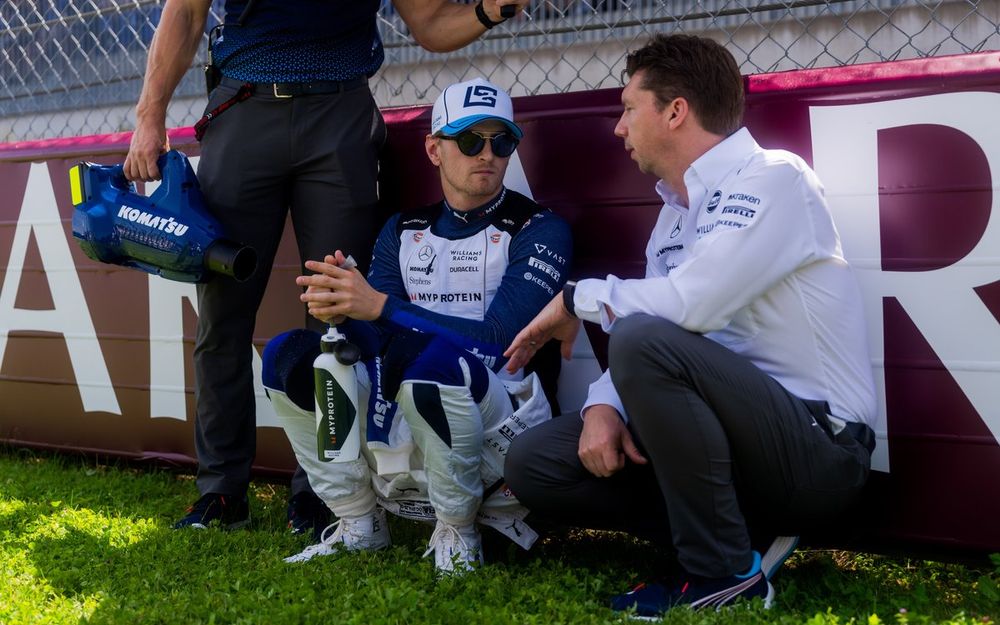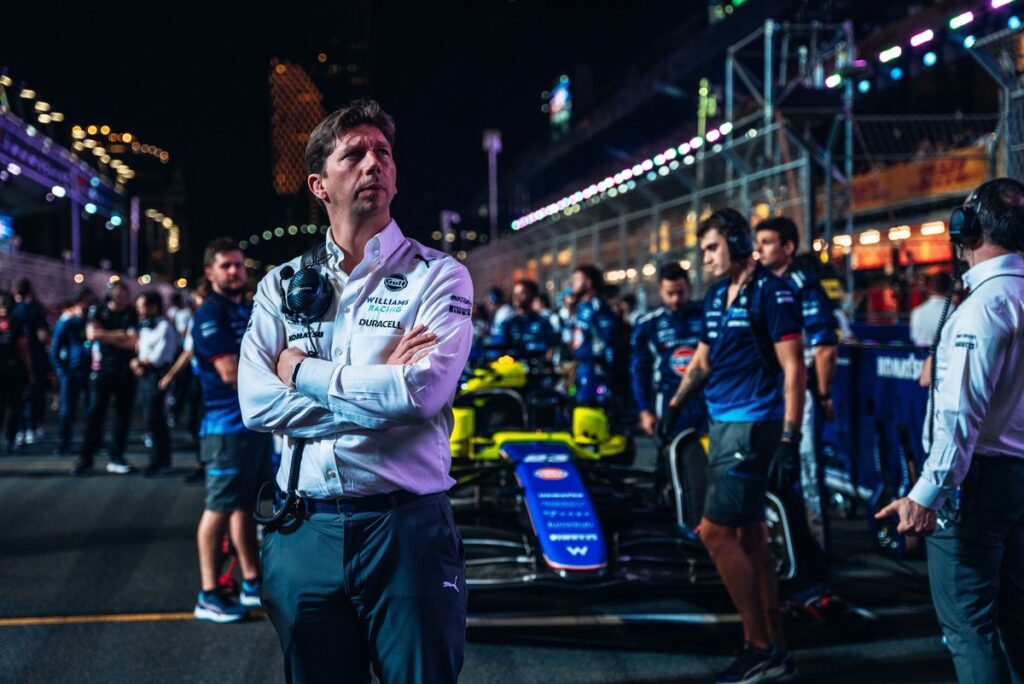Formula 1 can be a turbulent ride at times, but for Williams boss James Vowles the 2024 season has been extreme.
From starting the year with an overweight challenger, having no spare car early on, winning the race for Carlos Sainz’s services, dropping Logan Sargeant and then becoming a hero in Argentina because of Franco Colapinto’s brilliant form. It has been hard to keep up with it all.
Bouncing between these highs and lows may have left even Vowles struggling to catch his breath, but he is equally not a person who lets emotional swings get to him.
He well knows that he has been employed by Williams to help get the team back towards the front of the grid. And, while the Grove-based outfit has had some good days in the sun so far this year, he accepts there is still an awful long way to go before he can feel he is anywhere near accomplishing his mission.
“When I’m asked the question, are you happy with the first half of the season? You go ‘clearly not’,” Vowles told Autosport.
“We had so much potential and performance in the car that we didn’t utilise, and that’s frustrating. But my head is that everything is just stepping stones towards the long-term goal. That’s how I see things.
Alex Albon, Williams FW46
Photo by: Sam Bloxham / Motorsport Images
“Carlos is a fantastic addition, but he is just one of 1000 things that we need to do on our path towards going back towards the front.
“It’s the same as adding performance to the car and tangibly demonstrating to ourselves, not the world, that we are able to develop a car successfully against what is a very fierce field now.
“So, because I have that grounding of ’26, ’27 and just trying to get some fundamentals in place, you detach yourself from anything that you’re doing at that stage.
“It sounds odd, but it gives you the grounding you need, not to get carried away with the highs and lows of it all, because there’s plenty.”
Dropping Sargeant was ‘tough’
Perhaps the most difficult moment for Vowles came after the Dutch Grand Prix when he had to make the call to drop Sargeant.
With the American having not made the progress that had been hoped for against Alex Albon, a hefty crash with a newly updated car on Saturday morning in Zandvoort proved to be the final straw.

Logan Sargeant, Williams Racing, James Vowles, Williams Racing Team Principal
Photo by: Williams
While some individuals in the F1 paddock may revel in the opportunity of getting rid of people, Vowles admits it was not easy for him.
“I knew what came with the job when I chose to do it, but if you look up and down the grid, there’s very few team principals that ever changed their driver halfway through the year,” he said. “It is tough to do.
“But what I’m driven by is openness and honesty. Logan knew long before that point that he was at risk, and he knew what his targets were.
“I preferred to lay it down in a really raw way: ‘Here’s where you’re not performing at a level we need to, and that’s in your hands. I’ll help you as much as possible. But if we don’t get there, this is where we will make changes.’
“So as a result of that, I’m comfortable with myself, that I gave every opportunity that I could with Logan, and supported him in that opportunity at the same time.
“But my responsibility isn’t to one individual in this team, it’s to 1000 people that are here every weekend day in and day out.”
Franco Colapinto, Williams Racing
Photo by: Williams
The Colapinto impact
While dropping a driver is never nice, Vowles would probably admit that he could never have imagined Sargeant’s replacement Colapinto doing so well.
The Argentinian seemed instantly at home in F1 machinery and, after just missing out on the points in Italy, his eighth place in Baku drew massive praise from up and down the pitlane.
Vowles sees parallels to what has happened to Colapinto to his own journey through F1.
“I was a graduate 30 years ago,” said Vowles. “Someone trusted me and gave me opportunity all the way through my career, and I’m here today.
“Franco was someone I’ve known even before he joined Williams. He had no practice, jumped in the car, and did what he could with it.
“He’s bloody quick, deserved a chance, and I could see something that the rest of the world couldn’t see. He’s delivered on that, and it is a feel good factor. It really is.”
Franco Colapinto, Williams FW46
Photo by: Andrew Ferraro / Motorsport Images
Vowles also thinks that the story of giving a youngster like Colapinto a chance is one that stands true for bringing the next generation of talent through at Williams.
“At my core and Williams’ core, and that is why we align so well, is investing in future generations,” added Vowles. “Franco epitomises that fundamentally.
“We’re doing the same within the factory with brilliant graduates that we’re pushing through the organisation and giving opportunity to.
“It’s rewarding because that’s really at the core of what I want. I want future generations to not push me out of my role, but challenge me to the level where I have to let go of the reins of something I have a responsibility for.”
That Schumacher remark
It is not just on-track where Vowles has been in the spotlight though, because he has learned some tough lessons off it too.
Perhaps one of the biggest came at the Italian Grand Prix when Vowles found himself at the centre of a media frenzy after he made a remark about Mick Schumacher that grabbed the headlines.
Mick Schumacher, Reserve Driver, Mercedes-AMG F1 Team
Photo by: Sam Bloxham / Motorsport Images
Speaking about the decision to bring in rookie Colapinto rather than more experienced options like Schumacher, Vowles said: “I think we have to be straightforward about this. Mick isn’t special, he would just be good.”
The fallout of his ‘not special’ remark was quite extreme, and Vowles quickly realised his phrasing had not been great – which is why he apologised to Schumacher and his family.
Looking back at events now, Vowles admits it taught him a good lesson in being more careful in what he says.
“It’s difficult because that one for me, that’s clearly not what I meant, which is why I went and immediately apologised to him, his family and everyone around it,” he said.
“I was devastated at the time, because it showed me the power of a few words, and that I have to be far more diligent in what I’m doing and how I’m saying it.
“It was a learning lesson that I hope stays with me forever.”
Read the full article here

